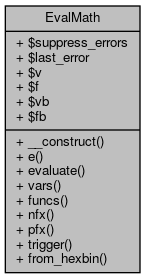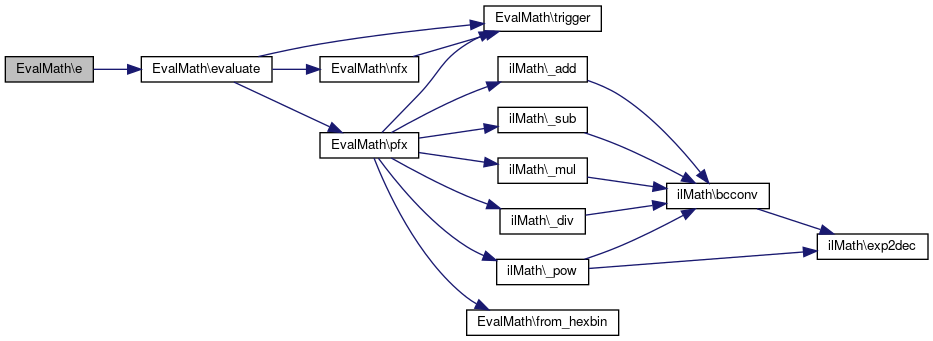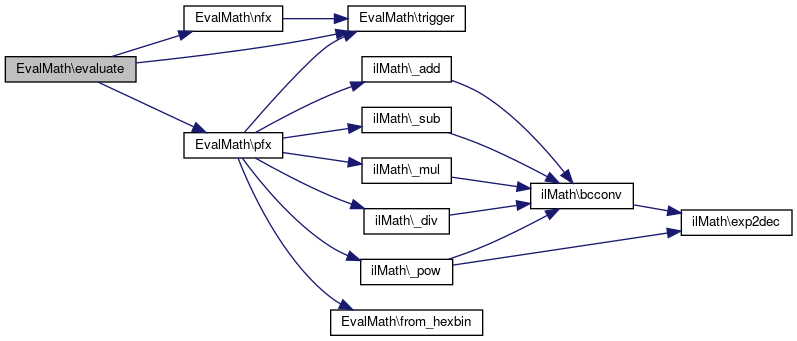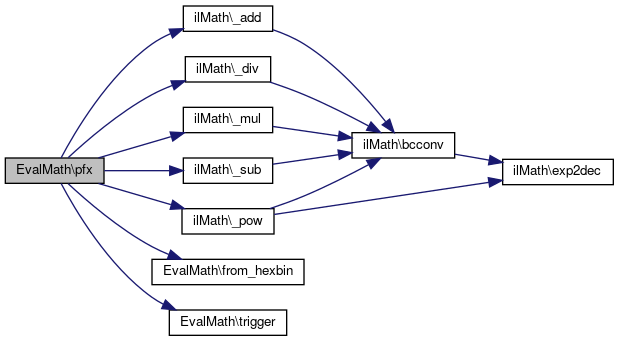 Collaboration diagram for EvalMath:
Collaboration diagram for EvalMath:Public Member Functions | |
| __construct () | |
| e ($expr) | |
| evaluate ($expr) | |
| vars () | |
| funcs () | |
| nfx ($expr) | |
| pfx ($tokens, $vars=array()) | |
| trigger ($msg) | |
| from_hexbin ($token) | |
Data Fields | |
| $suppress_errors = false | |
| $last_error = null | |
| $v = array('e'=>2.71,'pi'=>3.14) | |
| $f = array() | |
| $vb = array('e', 'pi') | |
| $fb | |
Detailed Description
Definition at line 89 of file class.EvalMath.php.
Constructor & Destructor Documentation
◆ __construct()
| EvalMath::__construct | ( | ) |
Definition at line 103 of file class.EvalMath.php.
Member Function Documentation
◆ e()
| EvalMath::e | ( | $expr | ) |
Definition at line 114 of file class.EvalMath.php.
References evaluate().
 Here is the call graph for this function:
Here is the call graph for this function:◆ evaluate()
| EvalMath::evaluate | ( | $expr | ) |
Definition at line 118 of file class.EvalMath.php.
References nfx(), pfx(), and trigger().
Referenced by e().
 Here is the call graph for this function:
Here is the call graph for this function: Here is the caller graph for this function:
Here is the caller graph for this function:◆ from_hexbin()
| EvalMath::from_hexbin | ( | $token | ) |
Definition at line 388 of file class.EvalMath.php.
Referenced by pfx().
 Here is the caller graph for this function:
Here is the caller graph for this function:◆ funcs()
| EvalMath::funcs | ( | ) |
Definition at line 174 of file class.EvalMath.php.
References $output.
◆ nfx()
| EvalMath::nfx | ( | $expr | ) |
Definition at line 184 of file class.EvalMath.php.
References $output, and trigger().
Referenced by evaluate().
 Here is the call graph for this function:
Here is the call graph for this function: Here is the caller graph for this function:
Here is the caller graph for this function:◆ pfx()
| EvalMath::pfx | ( | $tokens, | |
$vars = array() |
|||
| ) |
Definition at line 310 of file class.EvalMath.php.
References ilMath\_add(), ilMath\_div(), ilMath\_mul(), ilMath\_pow(), ilMath\_sub(), from_hexbin(), pfx(), and trigger().
Referenced by evaluate(), and pfx().
 Here is the call graph for this function:
Here is the call graph for this function: Here is the caller graph for this function:
Here is the caller graph for this function:◆ trigger()
| EvalMath::trigger | ( | $msg | ) |
Definition at line 380 of file class.EvalMath.php.
Referenced by evaluate(), nfx(), and pfx().
 Here is the caller graph for this function:
Here is the caller graph for this function:◆ vars()
| EvalMath::vars | ( | ) |
Definition at line 167 of file class.EvalMath.php.
Field Documentation
◆ $f
| EvalMath::$f = array() |
Definition at line 95 of file class.EvalMath.php.
◆ $fb
| EvalMath::$fb |
Definition at line 97 of file class.EvalMath.php.
◆ $last_error
| EvalMath::$last_error = null |
Definition at line 92 of file class.EvalMath.php.
◆ $suppress_errors
| EvalMath::$suppress_errors = false |
Definition at line 91 of file class.EvalMath.php.
◆ $v
| EvalMath::$v = array('e'=>2.71,'pi'=>3.14) |
Definition at line 94 of file class.EvalMath.php.
Referenced by vars().
◆ $vb
| EvalMath::$vb = array('e', 'pi') |
Definition at line 96 of file class.EvalMath.php.
The documentation for this class was generated from the following file:
- Services/Math/classes/class.EvalMath.php










